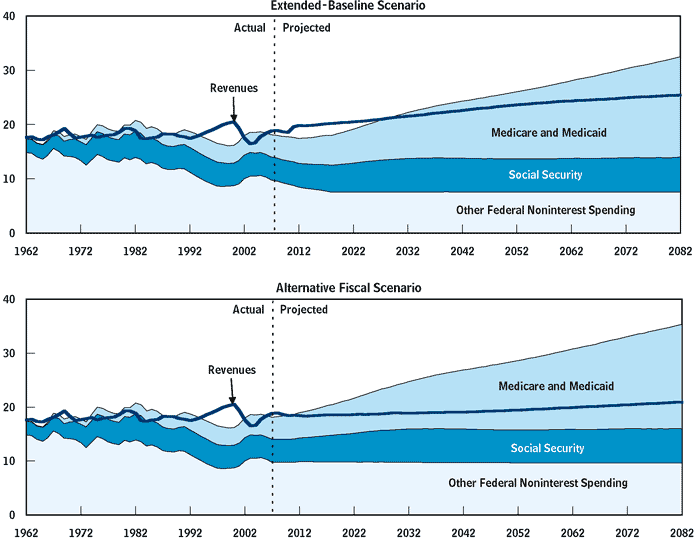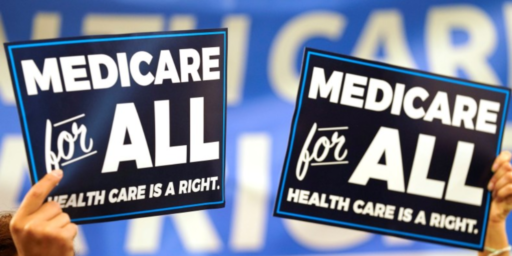Free Medicare for Everyone!
Kevin Drum, taking as a given that most of us are perfectly satisfied with our current health coverage but scared of losing it, offers an interesting solution:
[E]xpand Medicare (or create a similar program) to cover every person in America under the age of 21. And then let them keep it as they grow older. In ten years everyone under 31 would be covered. By 2050 at the latest the whole country would be covered — and probably earlier than that once the program reaches a critical mass. Taxes would rise slowly to cover each new cohort, employer healthcare would gradually go away, union contracts would have decades to adjust, and no one would have to give up anything they have now.
This is just watercooler conversation. I’ve given it no serious thought at all. But why not?
Mostly, because it largely ignores the costs issue.
To be sure, insuring young people is relatively inexpensive, since they aren’t large consumers of medical care. And people in their 20s make up a significant chunk of the uninsured, too, so it would plug a significant hole in the current system.
But the major problem with the current system isn’t “lack of insurance” so much as ridiculously high health care costs owing to high doctor fees, overuse of incredibly expensive tests and procedures to cope with tort liability issues, and other issues. This would do nothing to address that — and would presumably delay the sense of urgency to do so — while increasing the number of people on the public entitlement rolls.
Update (Steve Verdon): The biggest financial problem facing this country from a fiscal perspective is Medicare. Medicare is going to run out of money well before 2050 and things are going to start looking pretty grim in ten years.
According to the CBO in 2050 Medicare and Medicaid will account for 20% of GDP. That is, one out of every five dollars the economy produces will go just to Medicare and Medicaid. Or think of it this way, the entire federal budget will be only for Medicare and Medicaid, all other spending will have been crowded assuming that the federal budget is no more than 20% of GDP. That means no more defense spending, no more environmental spending, no more monuments, Library of Congress, Commerce Department, Labor Department, FERC, FDA, FCC, or Department of Education. If we keep these things and at a share equivalent to what we have today that means government spending will account for 40% of GDP. Add in state and local governments and the government will basically be well over 50% of the economy. And all this is without expanding demand.
So while James’ point that insuring the young is relatively cheap, when you increase demand and supply doesn’t shift, you get an increase in price. So Kevin’s idea will only hasten the point at which things will get bad. Further, Medicare doesn’t worry about things like risk. Why should it? After all it has the entire tax base upon which to depend on for funds. If you want a health care system that is really screwed up like nothing we’ve every seen, then Kevin’s idea is for you.






First, it’s not an “entitlement” if everyone’s paying for it in taxes, unless private insurance for which you pay premiums is an entitlement.
Second, while it does nothing to control costs, it’s arguably a necessary *step* to controlling costs. CMS would be in an ideal position to monitor healthcare costs and procedures and to make adjustments accordingly.
They’re already the 800-lb. gorilla in the room — they decided Nexium wasn’t any better than Prilosec and cost more, they quit paying for Nexium, the private insurers did the same thing within weeks if not days. One small example.
How about we just give everyone a million dollars. We would have the most millionaires in the world. The people can buy the health insurance, NFL package, a house in San Francisco, whatever. All our problems would be solved if we just gave everyone a million dollars. Note also that academic performance tracks to the economics of the family, so we would also be getting smarter kids.
Well, no. Private insurance provides coverage based on what one contributes and, unless one has insurance that covers disability, stops when one stops contributing. Medicare — especially a variant that kicks in the second one hits 21 regardless of contribution level — would guarantee the same benefit regardless of contribution.
History has shown us pumping more money into a system will not control costs.
James is right, something needs to be done to reduce or at least stabilize the cost side of the equation. If nothing is done about costs no one will be able to afford insurance.
Like many of the challenges facing us the answer is a thousand different things not one silver bullet that will cure all. We are all frozen, looking for that silver bullet, instead of starting to work on the thousand small solutions.
Physician salaries are a pimple on the “Great Medical Beast” A cardiologist averages $270K. After Med School, Internship, Residency and another 3 years for Board Certification, that’s hardly a deal. All things equal, Plumbers do better on average.
The ever increasing high-tech machines are a greater issue IMHO. Byzantine billing practices often hide the fact that the MRI machine, for example, costs $2 million to buy and install and another $800K per year to run. Hospital “A” has one so Hospital “B” has to have one- regardless of utilization.
Professor Bainbridge notes: “The Economist recently reported that “by one estimate, American health-care regulations cost $169 billion a year more than they yield in benefits, and lead to 7m Americans not being able to afford health insurance.†Yet, curiously, many people want to expand the role of government in regulating health care. How very odd.
“The Economist recently reported that “by one estimate, American health-care regulations cost $169 billion a year more than they yield in benefits
How on earth would one measure the benefits of healthcare regulations in dollars?
Nonsense, John425. In Britain, France, and Germany physician salaries are 1/3 what they are here.
Professional salaries constitute a significant portion of health care expenses and they’re growing fast. While insurance costs are a significant part of the total (roughly 30%), there may not be as much to optimize. But it’s part of the pie, too.
Health care costs are high in this country largely because of perverse incentives and a cartel in charge of the supply of health care. We’ve got to address all of the major cost components if we’re going to treat the problem seriously.
On the subject of the high costs of medical school, take the question one step further: why is medical school expensive? My answer: because the demand for billets continues to be high and the number of billets is fixed.
Jesus, did somebody flunk NPV calculations. Consider how much money this cardiologist will have if he works for 25 years making exactly $270 each and every year. Assuming a 3% annual increase in salary, the amount is even larger. We are talking millions of dollars. Multiply that by 100,000 doctors and you have hundreds of billions of dollars.
Add on the costs of nurses, nurse practitioners, and other health care professionals and I’m sure we can get easily into the trillions of dollars. Suddenly that is looking like one big pimple.
How do you propose high risk people be covered? or should they not be covered?
Well Grewgills that depends on why they are high risk doesn’t it. I realize you may not be big on things like personal responsibility, but if a person is high risk because of choices they make in life then shouldn’t they face the costs of those choices? Why should I have to subsidize at least part of the costs of such decisions? And you know how things go, subsidize something you tend to get more of that something.
As Dave Schuler pointed out part of the problem is perverse incentives. Ignoring why people are high risk and covering them anyways is one of those perverse incentives. On the other hand if the person has done nothing to be high risk or ends up facing high medical costs, then we as a society might very well decide to provide that care anyways. The trick is in constructing the incentives correctly to do so. Maybe it can’t be done then we really are left with an unpleasant choice.
But realize that one downside to your most likely solution, cover everyone irrespective of who they are and what kind of lifestyle choices they make, could very well end up leaving you so you can’t cover anyone, or only with crappy half-way measures. Decisions in life are about trade-offs; something I’m not sure Kevin Drum has learned.
David S,
Going to Med school is hardly a financial deal. Doctor who “go in it for the money” learn very quickly to start liking their careers for other reasons besides financial gain. Only a few make it rich, and only by devoting themselves more to bussiness than medicine.
frank, you probably should re-read my comments. I’ve never claimed that financial gain was the sole motivation for physicians. If you, on the other hand, are claiming that financial gain is no motivation at all for physicians, that’s absurd. I’d be happy to show you a JAMA article from just a few years ago that featured the following statement: “The practice of medicine offers a unique combination of doing good and doing well.”
How do you propose we treat poor people with adult onset diabetes who don’t take care of themselves and got the disease from eating like crap and never exercising?
Should we say, “Too bad, sucka” and not let them have any medical care because they can’t get insurance and can’t pay for the treatment? Do we just treat the acute emergency symptoms like heart attacks or strokes?
What about cancer victims? Certainly people with many forms of cancer brought it on themselves. Just let them die?
If your answer is, “yes, let them die,” then I respect that. Otherwise, it’s a cost/benefit issue that requires some sort of mandatory coverage and preventative care to hold down long term costs.
sure Dave, I never claimed that you claimed that financial gain was the sole motivational factor for doctors. And I certainly never claimed that financial motivation doesn’t exist. I DID state that there are doctors who “go in it” for the money, or in other words with the purpose of getting rich. And while some do, most don’t. Indeed, the majority of doctors learn to practice their trade for other reasons than finacial gain. “Doing well” is a consequence of a very special and needed profession, not lust for money…Frankly, I think you are lacking perspective if you think 270K is too much money for a top professional.
How far are you willing to carry that?
If someone smokes and is dropped by their insurance carrier or is charged such an exorbitant rate that they cannot afford insurance should they be forced to do without insurance? The attendant consequences are not being able to have medical care outside of ER visits which they will most likely not be able to pay for?
What if they eat poorly should they face the same consequences?
What if they fail to exercise adequately?
What if they just live too long?
So if you subsidize medical care you will get more medical care? or does this only work with subsidizing bad things?
OK. How would you go about structuring those incentives? Should people be forced to change unhealthy behaviors to get insurance or care?